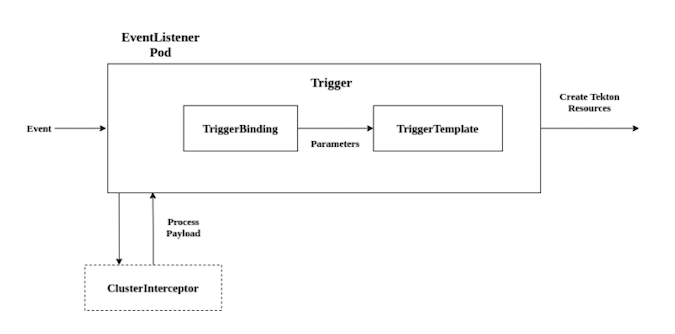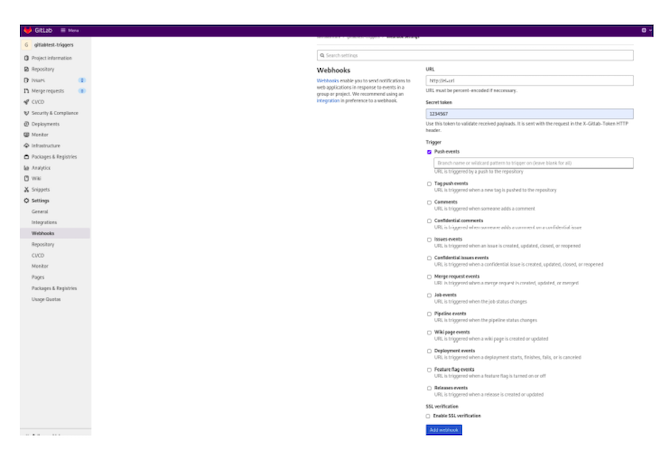13 KiB
Dynamic scheduling of Tekton workloads using Triggers
Upgrade your CI/CD pipeline with this Kubernetes-native application.

Tekton is a Kubernetes-native continuous integration and delivery (CI/CD) framework. It allows you to create containerized, composable, and configurable workloads declaratively through Kubernetes Custom Resource Definitions (CRD).
Tekton Triggers is a Tekton component that allows you to detect and extract information from events from various sources and execute TaskRuns and PipelineRuns based on that information. It also enables passing extracted information to TaskRuns and PipelineRuns from events.
This article demonstrates how Tekton Triggers integrates with external services, such as a Git repository, using GitLab as an example.
Prerequisites
If you want to follow the steps in this article, you must have a Kubernetes cluster running Kubernetes 1.18 or above with an ingress controller installed that can give you an external IP. You must also have Tekton Pipelines and Tekton Triggers installed.
Triggers flow
A Trigger works because Tekton, using a special pod called an EventListener, is able to monitor your cluster for a specific event. To pick up on relevant events, you can use a ClusterInterceptor. When an event occurs that you have identified as significant, the Tekton Trigger starts an action or workflow you have defined.
Credits: https://github.com/tektoncd/triggers/blob/main/images/TriggerFlow.svg
Tekton Trigger allows you to create a special resource called an EventListener, which is a Kubernetes service that listens for incoming HTTP requests from different sources, usually a Git repository, including those hosted on GitLab, GitHub, and others. Based on those events, the EventListener pod performs actions and creates Tekton resources, such as TaskRun or PipelineRun.
All Triggers resource definitions are created in YAML, the configuration format most commonly used in Kubernetes. However, before writing YAML files to define a Trigger, it's important to understand Tekton Triggers terminology.
EventListener
An EventListener is a Kubernetes service that listens for incoming HTTP requests and executes a Trigger. For example, after receiving a specific incoming request, this definition executes the gitlab-listener-trigger Trigger:
apiVersion: triggers.tekton.dev/v1beta1
kind: EventListener
metadata:
name: gitlab-event-listener
spec:
serviceAccountName: gitlab-listener-sa
triggers:
- triggerRef: gitlab-listener-trigger
resources:
kubernetesResource:
serviceType: NodePort
Trigger
A Trigger decides what to do with a received event. It also sets a TriggerBinding, TriggerTemplate, and optional interceptors to run. Triggers make use of interceptors to validate or modify incoming requests before proceeding.
apiVersion: triggers.tekton.dev/v1beta1
kind: Trigger
metadata:
name: gitlab-listener-trigger
spec:
interceptors:
- name: "verify-gitlab-payload"
ref:
name: "gitlab"
kind: ClusterInterceptor
params:
- name: secretRef
value:
secretName: "gitlab-secret"
secretKey: "secretToken"
- name: eventTypes
value:
- "Push Hook"
bindings:
- ref: binding
template:
ref: template
Interceptor
An interceptor is an event processor that runs before the TriggerBinding. It also performs payload filtering, verification (using a secret), and transformation; defines and tests trigger conditions; and implements other useful processing.
By default, four core interceptors are installed when installing Triggers: GitHub, GitLab, Bitbucket, and CEL. The installation also includes one Webhook interceptor for implementing custom business logic.
GitLab interceptors
GitLab interceptors help to validate and filter GitLab webhooks and filter incoming events by event type. The GitLab interceptor requires a secret token. This token is set when creating the webhook in GitLab and is validated by the GitLab interceptor when the request arrives.
apiVersion: v1
kind: Secret
metadata:
name: gitlab-secret
type: Opaque
stringData:
secretToken: "1234567"
TriggerBinding
After validating and modifying the incoming request, you need to extract values from the request and bind them to variables that you can later use in a TriggerTemplate to pass our Pipeline.
For our example, you just need a URL and a revision.
apiVersion: triggers.tekton.dev/v1beta1
kind: TriggerBinding
metadata:
name: binding
spec:
params:
- name: gitrevision
value: $(body.checkout_sha)
- name: gitrepositoryurl
value: $(body.repository.git_http_url)
TriggerTemplate
The TriggerTemplate is a blueprint that instantiates TaskRun or PipelineRun when EventListener detects an event.
apiVersion: triggers.tekton.dev/v1beta1
kind: TriggerTemplate
metadata:
name: template
spec:
params:
- name: gitrevision
- name: gitrepositoryurl
resourcetemplates:
- apiVersion: tekton.dev/v1alpha1
kind: TaskRun
metadata:
generateName: gitlab-run-
spec:
taskSpec:
inputs:
resources:
- name: source
type: git
steps:
- image: ubuntu
script: |
#! /bin/bash
ls -al $(inputs.resources.source.path)
inputs:
resources:
- name: source
resourceSpec:
type: git
params:
- name: revision
value: $(tt.params.gitrevision)
- name: url
value: $(tt.params.gitrepositoryurl)
Note that the pipeline resources module is, at the time of writing, being deprecated and will be replaced by git-clone tasks, from tektoncd/catalog.
Dynamically schedule workloads by configuring a webhook
First, create a new namespace, demo:
`$ kubectl create ns demo`
Next, before applying the Triggers resource, configure the required role-based access control (RBAC):
$ kubectl -n demo apply -f \
"<https://gist.githubusercontent.com/savitaashture/596bc4d93ff6b7606fe52aa20ba1ba14/raw/158a5ed0dc30fd1ebdac461147a4079cd6187eac/triggers-rbac.yaml>"
Note: RBAC configurations vary depending on the permissions.
Apply Triggers resources:
$ kubectl -n demo apply -f \
"<https://gist.githubusercontent.com/savitaashture/8aa013db1cb87f5dd1f2f96b0e121363/raw/f4f592d8c1332938878c5ab9641e350c6411e2b0/triggers-resource.yaml>"
After applying, verify the successful creation of the EventListener object and pod:
EL object READY status should be **True. **
$ kubectl get el -n demo
NAME ADDRESS AVAILABLE REASON READY REASON
gitlab-event-listener <http://el-gitlab-event-listener.demo.svc.cluster.local:8080> True MinimumReplicasAvailable True
EL Pod status should be Running.
$ kubectl get pods -n demo
NAME READY STATUS RESTARTS AGE
el-gitlab-event-listener-fb77ff8f7-p5wnv 1/1 Running 0 4m22s
Create ingress to get the external IP to configure in the GitLab webhook:
$ kubectl -n demo apply -f \
"<https://gist.githubusercontent.com/savitaashture/3b3554810e391477feae21bb8a9af93a/raw/56665b0a31c7a537f9acbb731b68a519be260808/triggers-ingress.yaml>"
Get the ingress IP:
$ kubectl get ingress triggers-ingress-resource -n demo
NAME CLASS HOSTS ADDRESS PORTS AGE
ingress-resource <none> * <address> 80 6s
Configure a webhook in GitLab. In your GitLab repository, go to Settings -> Webhooks.
Then set the below fields:
- URL: external IP Address from the Ingress with
/path - Secret token: 1234567, which should match the secret value created above from
triggers-resource.yamlfile
Choose event type from the Trigger section, then just select Push events, uncheck Enable SSL verification, and click on Add webhook.
Savita Ashture, CC BY-SA 4.0
Testing GitLab events by pushing PR
Clone your own GitLab repository, make changes, and push. For example:
$ git clone <https://gitlab.com/savitaashture1/gitlabtest-triggers>
$ cd gitlabtest-triggers
$ git commit -m "empty-commit" --allow-empty && git push origin main
[main 934ecba] empty-commit
Username for '<https://gitlab.com>': savitaashture
Password for '<https://savitaashture@gitlab.com>':
warning: redirecting to <https://gitlab.com/savitaashture1/gitlabtest-triggers.git/>
Enumerating objects: 1, done.
Counting objects: 100% (1/1), done.
Writing objects: 100% (1/1), 183 bytes | 183.00 KiB/s, done.
Total 1 (delta 0), reused 0 (delta 0)
To <https://gitlab.com/savitaashture1/gitlabtest-triggers>
ff1d11e..934ecba main -> main
Events will be generated and sent to the EventListener pod. You can verify this by doing:
kubectl get pods -n demo
kubectl logs -f <pod_name> -n demo
Verify successful delivery of events by doing a get operation for TaskRun.
$ kubectl -n demo get taskruns | grep gitlab-run-
gitlab-run-hvtll True Succeeded 95s 87s
Clean all resources created by Triggers by removing namespace demo:
$ kubectl delete ns demo
Conclusion
Tekton Triggers is one of the most useful modules that help schedule workloads dynamically in response to a user-defined set of events. Because of this module, my team was able to achieve end-to-end CI/CD.
via: https://opensource.com/article/21/11/kubernetes-dynamic-scheduling-tekton
作者:Savita Ashture 选题:lujun9972 译者:译者ID 校对:校对者ID

